
Journal of Hydrology X
Scope & Guideline
Advancing Water Science for a Sustainable Future
Introduction
Aims and Scopes
- Hydrological Modelling and Simulation:
The journal emphasizes the development and application of hydrological models to simulate various processes including precipitation, runoff, groundwater flow, and water quality. This includes both traditional modeling approaches and newer techniques such as machine learning. - Remote Sensing Applications:
A significant focus is on utilizing remote sensing technologies to gather data on hydrological phenomena, which aids in monitoring, predicting, and managing water resources effectively. - Climate Change Impact Studies:
Research addressing the impacts of climate change on hydrological systems, including changes in precipitation patterns, water availability, and ecosystem responses, is a core area of interest. - Water Resource Management and Policy:
The journal covers studies related to the management of water resources, including the socio-economic and policy dimensions of water use, conservation strategies, and the evaluation of nature-based solutions. - Interdisciplinary Approaches to Hydrology:
There is a consistent focus on integrating diverse scientific disciplines, such as ecology, geology, and social sciences, to enhance understanding of hydrological issues and promote sustainable practices.
Trending and Emerging
- Machine Learning in Hydrology:
There is a growing trend towards the application of machine learning techniques for hydrological predictions and modeling, indicating a shift towards data-driven approaches that enhance the accuracy and efficiency of hydrological assessments. - Nature-Based Solutions:
Research focusing on nature-based solutions for water management, which integrates ecological principles and sustainable practices, is gaining traction. This reflects a broader understanding of the necessity to balance human needs with environmental health. - Urban Hydrology and Flood Management:
An increase in studies addressing urban hydrology, particularly in relation to flood prediction and management, highlights the urgent need to understand and mitigate the impacts of urbanization on water systems. - Long-Term Hydrological Data Analysis:
There is a notable trend towards utilizing long-term hydrological datasets to derive insights and trends, emphasizing the importance of historical data in understanding current and future water resource challenges. - Impact of Climate Change on Water Systems:
Research exploring the impacts of climate change on various hydrological processes and water resource availability is increasingly prevalent, reflecting the urgent need for adaptive management strategies in response to changing environmental conditions.
Declining or Waning
- Traditional Hydrological Metrics:
There has been a noticeable decrease in studies relying solely on traditional hydrological metrics and indices. Researchers are increasingly leaning towards more complex and integrated approaches, reducing the prominence of simpler metrics. - Static Water Quality Assessments:
Research focusing exclusively on static water quality assessments, without considering dynamic interactions and real-time data integration, has become less common as the field moves towards more comprehensive and real-time monitoring techniques. - Conventional Groundwater Studies:
While groundwater research remains vital, the trend has shifted from conventional studies to more innovative techniques that incorporate advanced technologies and interdisciplinary methodologies, leading to a decline in traditional groundwater analysis.
Similar Journals
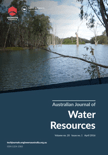
Australasian Journal of Water Resources
Elevating the Discourse on Water SustainabilityThe Australasian Journal of Water Resources, published by Taylor & Francis AS, stands as a pivotal resource in the field of water science and technology. With an ISSN of 1324-1583 and E-ISSN 2204-227X, this esteemed journal facilitates the dissemination of high-quality research articles that address critical issues facing water resources management across Australasia and beyond. Ranking in the Q2 category for Water Science and Technology as per the 2023 metrics, it boasts an impressive Scopus ranking of 75/261 in Environmental Science, placing it in the 71st percentile for its field. Spanning from 2008 to 2024, the journal emphasizes the importance of sustainable water practices, innovative technologies, and environmental policy, making it an invaluable asset for researchers, professionals, and students seeking to advance their knowledge and contribute to the discourse on water management challenges. The journal's rigorous peer-review process and commitment to open academic dialogue ensure that emerging trends and pioneering ideas receive the attention they deserve.
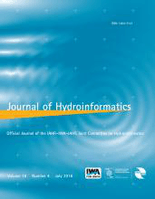
JOURNAL OF HYDROINFORMATICS
Advancing Water Science through Innovative Research.JOURNAL OF HYDROINFORMATICS, published by IWA PUBLISHING in the United Kingdom, is a leading open access journal in the field of water-related sciences and engineering. Since its inception in 1999, it has evolved to become a pivotal platform for the dissemination of significant research and innovative findings, especially after adopting an open access model in 2021. The journal spans a broad scope, intersecting various disciplines such as atmospheric science, civil and structural engineering, geotechnical engineering, and water science and technology, with its 2023 rankings placing it impressively in the Q2 quartile across several categories. With an impact factor reflective of its esteemed position within the academic community and its reach underscored by its Scopus rankings, the JOURNAL OF HYDROINFORMATICS appeals to a diverse readership including researchers, professionals, and students dedicated to advancing knowledge in hydroinformatics and related fields. Whether you are seeking to publish your cutting-edge research or to stay informed on the latest developments, this journal serves as an indispensable resource.

Hydrology Research
Innovative insights into hydrological processes.Hydrology Research, a leading academic journal published by IWA Publishing, is dedicated to advancing the field of water science and technology. With an impressive impact factor and a Q2 ranking in its category, the journal plays a pivotal role in disseminating innovative research and practices in hydrology. Established in 1973 and transitioning to an Open Access model in 2020, it provides unrestricted access to high-quality articles that cover a broad spectrum of topics, including hydrological processes, water management, and environmental impact assessments. Situated in Denmark, Hydrology Research continues to thrive as an essential platform for researchers, professionals, and students alike, encouraging the exchange of ideas that contribute to sustainable water solutions worldwide. With a comprehensive coverage of research converging from 1973 to 2024, it stands as a testament to ongoing progress in the water science community.
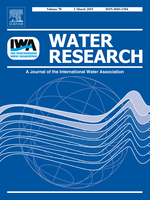
WATER RESEARCH
Cultivating a deeper understanding of our most vital resource.WATER RESEARCH, published by Pergamon-Elsevier Science Ltd, is a premier international journal dedicated to the advancement of knowledge in the interdisciplinary field of water science and technology. With a significant impact factor, WATER RESEARCH holds a distinguished position, consistently ranking in the top quartile (Q1) across multiple categories including Civil and Structural Engineering, Environmental Engineering, and Pollution. Established in 1967 and set to continue its legacy until at least 2024, this journal provides a vital platform for researchers and professionals to disseminate cutting-edge findings related to water sustainability, quality, and management. Although the journal follows a traditional access model, its commitment to disseminating impactful research ensures that it remains an essential resource for academia and industry alike. With a rigorous selection process, the journal includes articles that significantly contribute to the understanding and resolution of global water-related challenges, making it an invaluable asset for researchers, students, and practitioners engaged in this critical area of study.

Meteorology Hydrology and Water Management-Research and Operational Applications
Advancing knowledge at the intersection of water and weather.Meteorology Hydrology and Water Management - Research and Operational Applications is a prominent academic journal published by the Institute of Meteorology and Water Management, based in Warsaw, Poland. With a focus on advancing the understanding and application of meteorology, hydrology, and water resource management, this journal plays a crucial role in disseminating high-quality research that contributes to both theoretical knowledge and practical applications in these pivotal fields. Although it operates under traditional access options, the journal is dedicated to providing valuable insights and solutions to challenges faced by researchers, practitioners, and policymakers in water management and environmental studies. Researchers keen on exploring innovative methodologies, operational tools, and empirical studies will find this journal an essential resource in enhancing their work and understanding of the dynamic interplay between meteorological phenomena and water resource management. The journal's commitment to maintaining rigorous scholarly standards ensures that every publication drives impactful dialogues within the community and beyond.

JOURNAL OF THE AMERICAN WATER RESOURCES ASSOCIATION
Connecting researchers and practitioners in the vital realm of water resources.The JOURNAL OF THE AMERICAN WATER RESOURCES ASSOCIATION, published by Wiley, is a premier platform dedicated to advancing the field of water resource management and research. With an ISSN of 1093-474X and an impressive Q1 ranking in multiple categories, including Earth-Surface Processes, Ecology, and Water Science and Technology, this journal serves as a vital resource for professionals, researchers, and students alike. Established in 1967 and set to converge through 2024, it has consistently published cutting-edge research that influences policy and practice in water resource management. The journal's open access option enhances its reach, ensuring that critical findings are accessible to a wider audience. The Scopus rankings further underscore its impact, placing it in the top quartile within its fields, highlighting its importance in shaping scholarly discourse. As a significant contributor to the understanding and management of freshwater systems, the journal offers a crucial means for sharing insights and fostering collaboration in the vital realm of water resources.

Hydrology
Advancing water science for a sustainable future.Hydrology, published by MDPI, is a prominent open-access journal dedicated to advancing the field of hydrological science. Since its establishment in 2014, the journal has garnered a reputation for excellence, reflected in its classification within the Q2 quartile for 2023 across multiple categories including Earth-Surface Processes, Oceanography, Water Science and Technology, and Waste Management and Disposal. Based in Switzerland, Hydrology provides a vital platform for scholars and practitioners to disseminate research findings, promote innovative methodologies, and foster discussions on current trends affecting water resources and management globally. The journal is easily accessible online and aims to significantly contribute to the understanding of hydrological processes, offering insights that are pivotal for addressing contemporary environmental challenges. With Scopus rankings showcasing its growing influence, Hydrology is a crucial resource for researchers, students, and professionals committed to water science and sustainable practices.
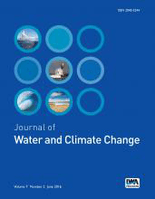
Journal of Water and Climate Change
Championing Interdisciplinary Research for a Water-Secure FutureJournal of Water and Climate Change is a premier open-access journal published by IWA Publishing, dedicated to advancing the understanding of the interplay between water resources and climate change. With an ISSN of 2040-2244 and an E-ISSN of 2408-9354, this journal has established itself as a crucial platform for interdisciplinary research, publishing high-quality articles that address the challenges posed by climate variability on water systems globally. Since achieving open access status in 2021, the journal has fostered wider dissemination of knowledge among its audience, featuring works that span pivotal topics in Atmospheric Science, Global and Planetary Change, and Water Management. Notably ranked within the top quartiles in several relevant categories as of 2023, it occupies a vital position in the academic community, offering insights that are essential for policymakers, environmental scientists, and researchers striving to create sustainable solutions for water and climate challenges. Its commitment to excellence is reflected in its strong Scopus rankings, standing at the 66th percentile in Water Science and Technology and 65th percentile in Management, Monitoring, Policy, and Law. Located in the United Kingdom, this journal not only serves as a repository of cutting-edge research from 2010 to 2024 but also engages a diverse readership passionate about promoting sustainable water management practices.
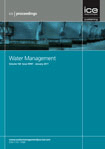
PROCEEDINGS OF THE INSTITUTION OF CIVIL ENGINEERS-WATER MANAGEMENT
Connecting Research and Practice in Water ManagementPROCEEDINGS OF THE INSTITUTION OF CIVIL ENGINEERS-WATER MANAGEMENT is a prestigious journal published by Emerald Group Publishing Ltd, dedicated to advancing the field of water management within civil engineering. With an ISSN of 1741-7589 and an E-ISSN of 1751-7729, this journal delivers peer-reviewed research that spans the critical intersections of water science and technology, contributing valuable insights into sustainable water management practices. As evidenced by its ranking in the 2023 Scopus categories, where it holds the Q3 quartile in Water Science and Technology, and a respectable position among its peers, the journal remains a vital resource for researchers, professionals, and students in the field. Though it is not an open-access journal, it offers accessible subscription options that facilitate worldwide dissemination of knowledge, enhancing its role as a fundamental reference point for cutting-edge developments in water management. For those looking to publish or stay updated on the latest research trends, this journal serves as an essential platform for promoting innovation and sustainable practices in civil engineering and water resources management.
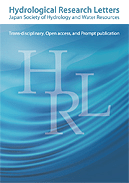
Hydrological Research Letters
Unlocking Knowledge: Pioneering Research in Water ScienceHydrological Research Letters (ISSN: 1882-3416) is a distinguished peer-reviewed journal published by JSHWR, JAGH, JAHS, JSPH in Japan. Established with open access since 2007, this journal serves as a critical platform for the dissemination of innovative research in the field of hydrology, water science, and technology. With an increasing impact factor, currently positioned in the Q3 quartile for both Earth and Planetary Sciences and Water Science and Technology, it attracts a diverse readership keen to stay abreast of groundbreaking findings that shape water management and environmental policy. Researchers, professionals, and students alike will find this publication an invaluable resource for enhancing their understanding of hydrological processes and their implications. The journal is committed to fostering open academic dialogue and encouraging high-quality contributions during its converging years from 2015 to 2024. For more information, authors and readers can access the journal at its address, C/O INT ACAD PRINTING CO, LTD, Shinjuku-ku, Tokyo, Japan.